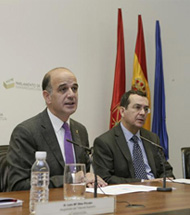XI classroom of Parliamentary Law: 'The Reform of the Judiciary'.

The President of the Parliament of Navarra, Alberto Catalánhas shown his disagreement with the agreement reached in the congress for the renewal of the committee General of the Judiciary. A agreement, he said, that "may be good from a political point of view, but not from the point of view of citizens or from the image of Justice. And I say this because I have always defended consensus on crucial issues, but not for the distribution of positions".
The President has expressed himself in this way before Luis María Díez-Picazo, Magistrate of the Supreme Court and Juan Damián Moreno, Full Professor of Procedural Law of the Autonomous University of Madrid, two of the seven members of the Commission in charge of elaborating the proposal of modification of the Organic Law of the Judiciary and the Law of Demarcation and Plant that is at the origin of the majority support reached last week in the Chamber leave.
Catalán has regretted the change of opinion of "some who, today in the Government", defended that the "judges and magistrates themselves should directly elect 12 of the 20 members of the CGPJ" and of those "others who, after questioning the reform before the Constitutional Court, have accepted to enter into the distribution of an institution core topic".
In the President's opinion, making the independence of the Judiciary and its highest governing body "permanent object of discussion does nothing but contribute to increase the discredit of the set of institutions on which the democratic system is articulated, which as such should be characterized by the division of powers".
Thus, Alberto Catalán has called to continue working towards a "more efficient, apolitical and impartial" justice, because that is where the keys to this "idealmodel lie, which will undoubtedly contribute to improving the quality of our democracy".
In spite of what has been stated, the President of the Regional Legislative highlighted the "important role played by the judges in consolidating the Democratic, Social and Lawful State" which, in order to "guarantee equality before the Law and the development of the Welfare State, is advocated by the Spanish Constitution, whose "recognition of the singularity of Navarre and its Foral regime" he underlined before concluding.
Next, Luis María Díez-PicazoMagistrate of the Supreme Court, Juan Damián MorenoFull Professor of Procedural Law of the Universidad Autónoma de Madrid, and Juan Manuel Fernández, President of the High Court of Justice of Navarra, have offered a lecture to, in the framework of the activities organized by the 'classroom de Derecho', analyze the role of the high judiciary in the Reform of the Judiciary.
Ángel Gómez Montorodirector of the classroom of Law and former Rector of the University of Navarra, has been in charge of introducing and contextualizing the presentations, which have revolved around the judicial organization, the professional status of the judge and the committee General of the Judiciary, in his opinion "the instructions of the complete transformation of the Judiciary that is projected".
The 'classroom Parliamentary Law' is an instrument at the service of the university community, aimed at deepening the study and knowledge of the political and parliamentary system.
To develop this goal, the classroom organizes every year conference and conferences with speakers of recognized prestige and a high scientific level.
The classroom is freely managed by the department of Constitutional Law of the University of Navarra, on which it has depended since it was created in 2002, as a result of an agreement agreement with the Parliament of Navarra.
